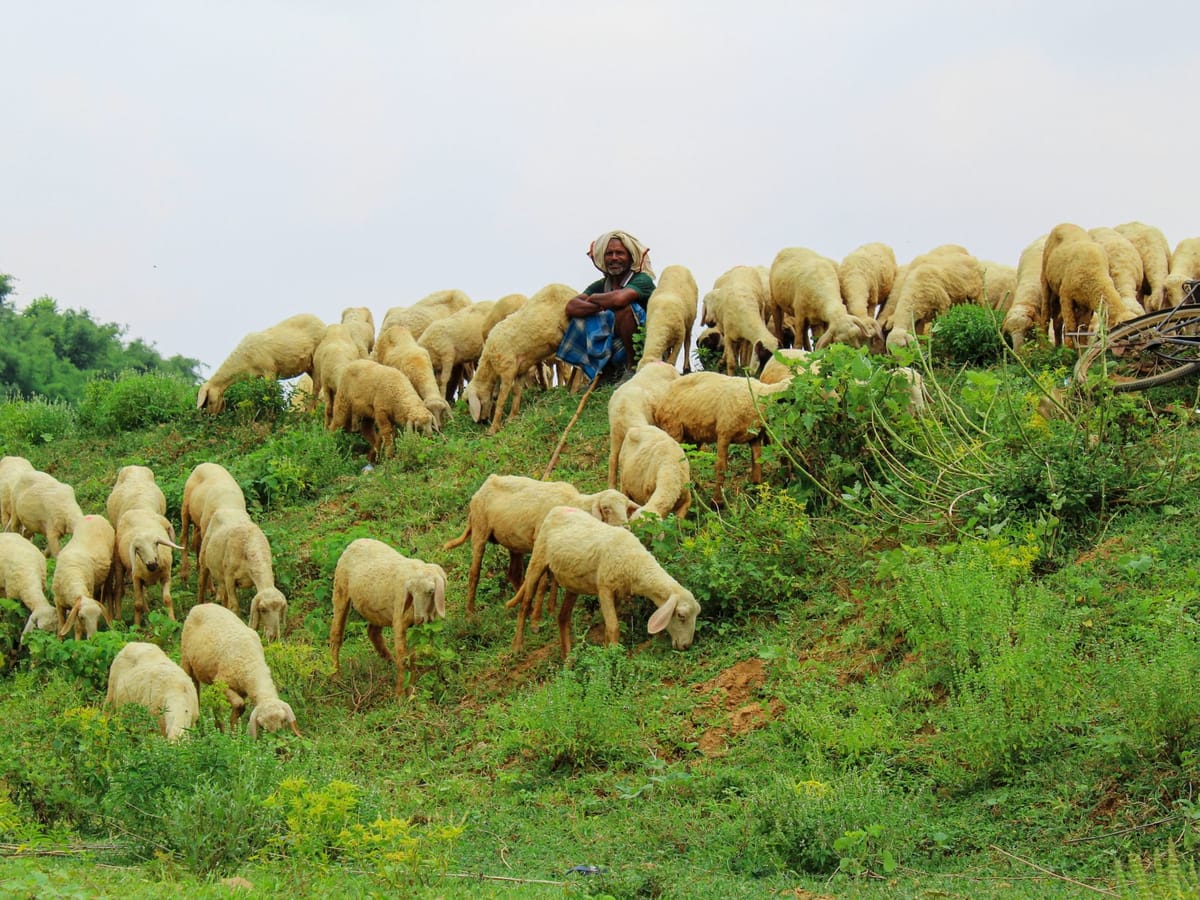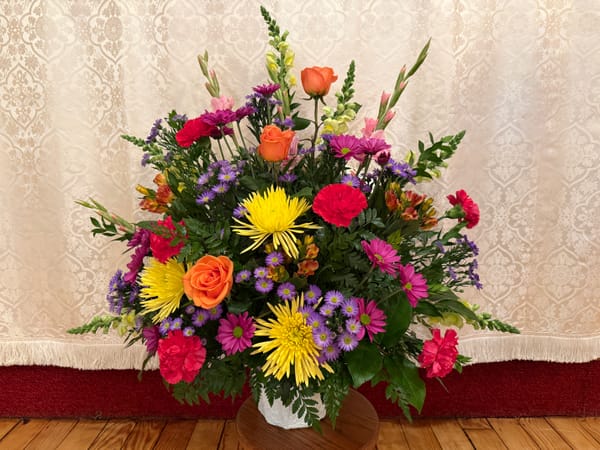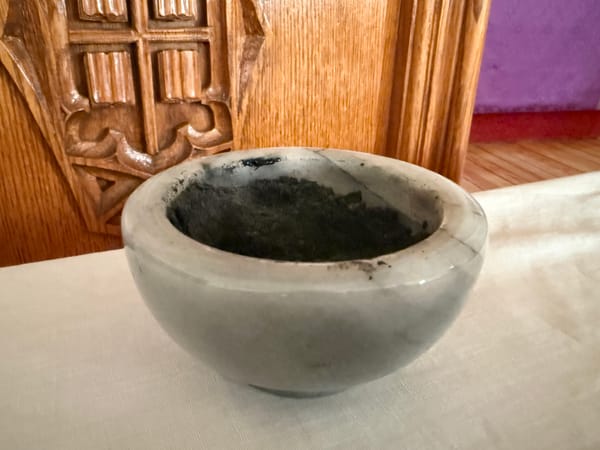The Good Shepherd Needs No Fences
We are all worthy of that sort of love, of a shepherd who leaves everything to save us; we are all worthy of a community who celebrates our return.

September 14, 2025 - The Fourteenth Sunday after Pentecost
My friends, I speak to you today in the name of one God, Father, Son, and Holy Spirit. Amen. Please be seated.
Good morning, Epiphany. Contrary to what some of you may think, to what some of you promised me in my interview to be your rector back in December of 2023, this is a very challenging job, being your priest. It’s not that you are a challenging congregation, or that South Haven is a challenging place to live. But one of the many roles of being a priest is actively listening to the anxieties and concerns of the people and then offering those to God in prayer. This week, every day this week, I sat with you individually in your homes and in coffee shops and in backyard gardens and I heard your theological concerns, your political concerns, your familial concerns, your health concerns. It was very, very good work, don’t get me wrong. But, man, we are all so broken, we are all facing challenges.
Now I don’t say that this is a challenging job looking for your pity either! Nor for a raise! This is my calling, sitting with you is one of the main reasons you called a full-time priest here to Epiphany, and it is my privilege, without a doubt. I know deeply that this is good work, that the church is built for this, that we all need someone to talk to, to know us well, that we all need to offer our prayers and petitions to God, and that that is best done together, in community. You all have been doing it for each other for years, and you even do it at brunch. I’m always going to be available for that. Instead, I tell you today that this was a challenging week to be your priest, in part, to contrast it with the ease, beauty, and simplicity of this morning’s gospel reading from Luke. Last week, we read Jesus telling the people to hate their families and life itself... this week, well, it is not quite so difficult.
Luke 15 has been called “the gospel within the gospel”; the images of Jesus as shepherd, of angels rejoicing in heaven when the lost sheep is found, these are very good images. We love a Jesus who would welcome sinners and eat with them, not caught up in religion but simply living the love and welcome that he preached. We love a Jesus who would seek the lost, not only sticking to those who would readily follow him... this is a passage Christians of all traditions, all denominations have loved for centuries. When we shared it in community this week, so many different, beloved lessons popped up for people; there is just so much resonance with this story. Same too with the woman looking for her one lost silver coin, though that “sweeping the house to find a single coin” bit inspired some jokes about her potential OCD. But the sheep, the shepherd who leaves the safe 99 behind to looks for the one who is lost, that’s an image of Jesus that we really appreciate. We are all worthy of that sort of love, of a shepherd who leaves everything behind to come and save us, and we have it in Jesus Christ. We are all worthy of a community who would celebrate our return, not holding us in judgment for having gotten lost, but rejoicing that we have been found, and we have that here, in the church, in Epiphany.
I was struck this week though, that while this may be a passage, a parable that we can love and appreciate at face value, it is not a parable that Jesus would be likely to tell to religious leaders today. That’s not because the messages aren’t good ones, but because it doesn’t fit our context as well as it did in the first century. Now let’s see here, how many of you own sheep? How many know a shepherd? The lost coin story, maybe that we can relate to, but I would venture a guess and say that none of us have “tending sheep” on our resumé. Am I wrong? (Maybe I am!) The closest many of us have been to sheep is likely at a petting zoo; I know there are a few at Dutch Village up in Holland. That’s our girls’ last experience with the fluffy beasts. I ran into a herd of sheep being shepherded down a road in rural Ireland once. There, we would see sheep in large grazing fields, some right on the sides of cliffs, always fenced off from danger, carefully tracked and tended for sheering, brought into safety for the night. That’s about as close as I’ll ever get, riding my bicycle down the street through a herd of sheep. I’m guessing that’s the sort of story we all may have, viewing them from afar, appreciating them at petting zoos.
As you might expect, though, that’s because shepherding in the year 2025 is a different thing altogether from shepherding in the year 30. Though the differences are many, I’m going to argue for us this morning that there is one fundamental difference that has affected the church in its telling of this and other sheep-related parables in the last two or three centuries. There is one fundamental difference for us today, one that all of us need to remember as we live out our Christian lives, our lives here in this building, in this community, our lives in our families, our lives in this chaotic world.
You see, in the first century, shepherds had no fences.
Now, that may seem like a benign difference on first glance, and maybe some of you already knew this, thanks to flannel boards and children’s stories in Sunday school lessons, thanks to Christmas hymns about shepherds watching their flocks by night. Though I’ll readily admit that I’m not an expert in this field, a quick dive into the history of shepherding this week indicated that fences began being used in the practice of sheep farming in the 17- and 1800s in colonial Australia. At their beginning, fences were actually used not to keep a flock of sheep confined to a certain space, but to keep the sheep out of certain areas like gardens and cultivated fields. The sheep were expected to roam, so people put up fences around their crops to keep them safe from livestock.
But ever since the introduction of fences as barriers to keep sheep in rather than out (a fairly modern innovation), ever since then, shepherds have known the boundaries of their land, the edges of where their sheep are allowed to be. Losing a sheep today would mean a grievous error had been made, and the shepherd who has to go find that lost sheep would be quickly bringing it back inside its fences.
That’s not how it was in the first century, that’s not how it was in the 16th century. In Jesus’s time, a shepherd would tend the flock, would stay with and sleep among the sheep, and they would stick together, answering to the call of the shepherd’s voice, which is another metaphor Jesus uses well in the Gospel of John. But the big difference, what I want to emphasize today, is not that the sheep could smell the shepherd or know his voice; that’s another sermon for another day. No, the biggest difference is that shepherds did not have to use fences to keep their sheep together. They simply led them to water.
Shepherds tended their flocks, they stayed with them, but the sheep roamed around a given area, hence why sheep could get lost. They explored, and that was part of the deal. But one thing the shepherds knew their sheep needed was a good water source, they needed it to survive, and that’s something sheep often didn’t find on their own. And so, shepherds would lead them, inviting them, to good water, to wells, to rivers, to streams.
Friends, the institutional church, especially the church in America, has too often built fences to keep its sheep safe from would-be predators without letting them roam, trusting they’d come back to good water. The Episcopal Church is guilty of this, the Roman Catholic Church is really guilty of this, but every church is guilty of this. With fences built, we can dictate exactly what happens to our sheep, we can figure out which sheep are in and which sheep are out. It is easier to tend to sheep within fences, to build protection from those on the outside, to keep an administrative eye on the whole thing from the safety of the farmhouse rather than from the ground of an open field.
But the first-century shepherds of the Bible, and the good shepherd who is Jesus Christ, they had no concept of fences. They simply stayed with their sheep, lived among their sheep, and led their sheep to the good water. The sheep would roam where they would roam, and if they got lost, they were in danger of predators and in danger of losing their water source, so the shepherds would go find them and lead them back to their community, but they never fenced them in. I can imagine each farmer having one or two rascally sheep who would always go off over a hill, who would cause them problems... every parent or teacher can probably imagine that too. But even caring for that lost sheep didn’t involve fencing off that exploration; it just meant a constant invitation back to the life of the herd, to safety, to access to good water.
If that metaphor hasn’t connected with you yet this morning (after what, 12 minutes?) or if you’re wondering how this applies to you and your life here this week, let me try to make it a little clearer, though its applications are vast and varied, individually and communally. Essentially, this morning, we cannot be Christians, we cannot say we are followers of Jesus, if we stubbornly try to control everything and everyone around us. It may seem like common sense, especially after last week’s sermon about letting go, about setting everything down and trusting in God. But in times of great anxiety, in times of turmoil and uncertainty, in times of assassinations and wars and rumors of wars, in times when our bodies are failing us or our friends are dying or our families are breaking apart, we often get scared, and we think we need control, and we often want to build our little fences. We often want to save whatever lost sheep there may be by bringing them within our walls, making sure they do what we want them to do, lest we lose something of who we are, and then keeping out anything or anyone who might threaten both us and them.
Friends, this morning, I argue that our world needs far fewer fences and far more wells, far more access points for the living water that is Christ. Our world needs less control and judgment and more unconditional welcome and love. Our world needs more shepherds who, when they see a sheep who may have gotten lost, shepherds who invite that sheep to a safe and loving community, and then allow it to be exactly who it is, freely roaming in the herd and experiencing love, so that all may rejoice.
And if we build our lives, our families, our churches simply around that open invitation to the living water, around an invitation to love, we’re likely to get a varied but healthy flock! Here at Epiphany, we will have introverts and extroverts in the same herd; we’ll have those who love church tradition and those who are more spiritual than religious and even those who distrust everything that’s too churchy, like baptism and communion and even those Sanctus bells (and that’s okay). We’ll have those who lean conservative and those who lean progressive, both theologically and politically; we’ll have those who love classical hymns and those who love praise songs; we’ll have those who miss the red carpet and those who love the wood floor; we’ll have those who love a 20-minute passing of the peace and those who prefer it jussst a bit shorter; we’ll have those who can bring multiple homemade dishes for brunch and those who can’t bring anything but themselves; we’ll even have those who skip brunch because it’s overwhelming and those who can’t help but find themselves in the kitchen every single week. The variation is beautiful, and it is all covered in grace, because we have the love of Christ, and not ourselves, at the center.
So too our families might change. If we simply make it our task to invite our family members to love, we will inevitably have a variation; those who keep their distance, and those who call every night, those who drive us crazy, and those we could not live without. We can’t control any of that. We just love. And maybe, our communities and our nation can change too; that is certainly something for which we pray. All we can do is make it our daily task to live lives of love, lives that will unavoidably, inescapably invite everyone to the source of our living water, that is Jesus.
This morning, this week, I invite all of us to tear down all our fences and build some really good wells. May we all live lives of inviting, abundant, and overflowing love. May we trust in the good shepherd who is Jesus, who will lead us and guide us and rejoice when we are found in him. And may we all rejoice with the angels of God when anyone who has lost their access to the living water finds it again.
Amen.




